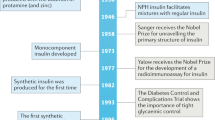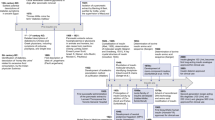Summary
TWENTY-SEVEN insulin requiring diabetics, who had been treated with conventional non-purified insulins for at least four years, were transferred to a regimen of highly purified mixed species (porcine/bovine) insulin.
They were seen at 3-monthly intervals for two years during which the binding of labelled porcine and bovine insulins by serum was monitored, as was insulin dose, glycosylated haemoglobin and mean fasting blood glucose.
Insulin binding by antibody fell from a mean (±ISD) of 13.3±13.7% (bovine) and 8.1±8.4% (porcine) at the beginning of the study to 6.8±8.0% (bovine) and 2.3±1.9% (porcine) 2 years after the change to mixed species insulin. This change reached statistical significance 60 weeks after the transfer.
In contrast, antibodies to the insulin contaminant pancreatic polypeptide were significantly reduced 4 weeks after transfer to the mixed species insulins. They fell from 64 (±27)% at week 0 to 14.8 (±7.2)% at week 108.
This study indicates the relatively high immunogenicity of highly purified mixtures of beef and pork insulins. In addition, the faster reduction of antibodies to pancreatic polypeptide suggests that this immunogenic impurity has been removed from the highly purified preparations and that the continuing insulin antibody production was caused by the intrinsic immunogenicity of the insulin; it is likely that bovine insulin possesses more immunogenic determinants than porcine insulin.
Similar content being viewed by others
References
Andreani, D. 1974. Some aspects of treatment with monocomponent (MC) and monospecies (MS) insulins. Excerpta Medica, Amsterdam, Int. Congr. Ser. No. 316: 68–75.
Bloom, S. R., Adrian, T. E., Barnes, A. J. and Polak, J. M. 1979. Autoimmunity in diabetics induced by hormonal contaminants of insulin. Lancet i, 14–17.
Chance, R. E., Root, M. A., Galloway, J. A. The Immunogenicity of Insulin Preparations. Acta Endocrinol. (Kbh) 83 (Supp. 205), 185–198.
Graber, D., Fankhauser, S. 1978. Antigenicity of some new, chromatographically purified, depot insulins. Schweiz Med. Wschr. 19, 329–34.
Keck, K. 1977. In Gene Control of Carrier Recognition: III Co-operative recognition of two or more carrier determinants on insulins of different species. Eur. J. Immunol. 7, 811–816.
Kurtz, A. B., Matthews, J. A., Mustaffa, B. E., Daggett, P. R., Nabarro, J. D. N. 1980. Decrease of antibodies to insulin, proinsulin and contaminating hormones after changing treatment from conventional beef to purified pork insulin. Diabetologia 18, 147–150.
Schlichtkrull, J. 1978. Purity and Antigenicity of Insulin Preparations. Paper presented at the Insulin Workshop, Juvenile Diabetes Federation, New York.
Tattersall, R. B., Peacock, I., Taylor, A., Reeves, W. G. 1982. Changing to purified bovine insulin reduces the level of C-peptide antibody without affecting insulin antibody. Paper presented at the B.D.A. Meeting, Dublin, Sept.
Walford, S., Allison, S. P., Reeves, W. G. 1982. The effect of insulin antibodies on insulin dose and diabetic control. Diabetologia 22, 106–110.
Author information
Authors and Affiliations
Rights and permissions
About this article
Cite this article
Drury, M.I., Cregan, D., Drury, R.M. et al. Antibody responses following change-over to mixed species (porcine/bovine) insulins. I.J.M.S. 152, 325–328 (1983). https://doi.org/10.1007/BF02954729
Issue Date:
DOI: https://doi.org/10.1007/BF02954729




